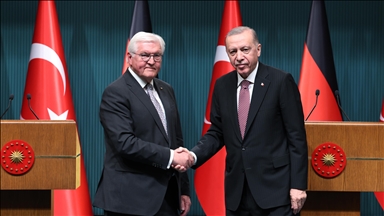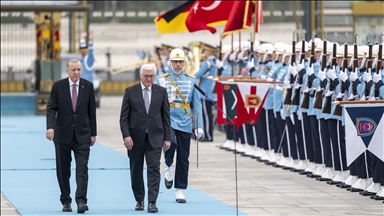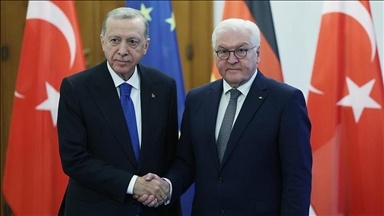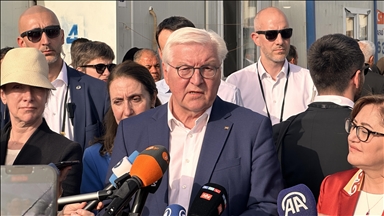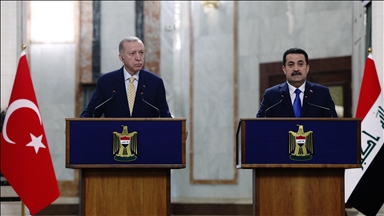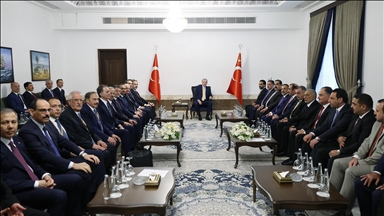New presidential system to make Turkey stronger: Erdogan
Erdogan has rejected suggestions that democracy suffers if presidents were political party members
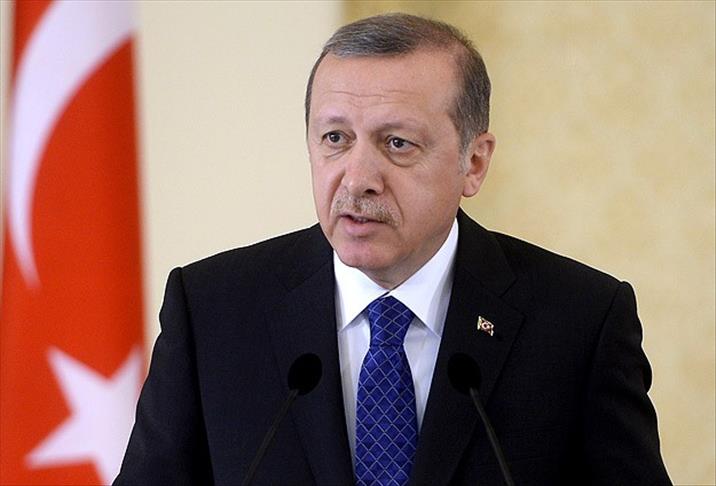
ANKARA
A party-based new presidential system will make Turkey stronger, Turkish President Recep Tayyip Erdogan has said.
In an interview broadcast live on the private ATV& A Haber television networks late Thursday night, Erdogan called for backing up the new proposed presidential system with a new constitution.
"When I was competing for the presidency, I suggested that the party-member system should be brought together with a [new] constitution. This will make Turkey stronger," he said.
Erdogan gave examples of Russia, France and the U.S., where, he said, such a system worked well and rejected suggestions that democracy would suffer if presidents were political party-members.
"The problem in Turkey is rooted in this party-member, no-party-membership issue," he said. "The countries who have party based member presidents can decide quickly on implementations and punishments," he added.
"Being a president does not abolish being a politician," he said, adding: "We have a political approach. I have an equal distance to every party."
The Turkish president also noted that during the 2011 elections, the ruling Justice and Development, or the AK Party bagged around 50 percent votes, while the presidential elections that he won saw the support of around 52 percent votes.
"This difference shows that I got votes from some other parties as well," he said.
This is not the first time Erdogan has sought support for replacing the current parliamentary form of democracy with a new presidential system; he has made the same call in many of his recent speeches across Turkey and abroad.
When asked whether he was being "too tough" in his public speeches, Erdogan said: "My people get me in these speeches...This is the way of talk of Tayyip Erdogan."
‘Obliged to give security of life’
About the “solution process” with the outlawed Kurdistan Workers' Party (PKK) that is aimed at finding an end to the banned organization’s 40-year terrorist campaign against Turkey, Erdogan said: "We are obliged to provide security of life and goods [to all] in this country. We will do whatever it needs to be done [to achieve that], no matter what. Our army and security forces will not give any credit to be in turmoil like this."
Erdogan also affiliated PKK with the pro-Kurdish People's Democracy Party, or the HDP. "If there are no sanctions [on HDP] right now, [then it must be understood that] it is for the sake of the solution process," he said.
The president also revealed that some privileges had been granted to the jailed PKK leader Abdullah Ocalan. He said that Ocalan had been given companionship of convicts "because he was lonely" in the Imrali Island, where he was being held.
"[Such measures] were all messages to our Kurdish people," Erdogan said. "To erase all the lies and to show them what is actually being done for the solution process," he added.
The "solution process" began in 2013 that aims to ending the decades-old conflict with the PKK, which has claimed the lives of more than 40,000 people in Turkey.
‘Gulen schools backed by US’
About how Turkey was dealing with the “parallel structure” and its network of schools, Erdogan said that the U.S.-based preacher, Fethullah Gulen, had "ran away" to the U.S. in 1999, who then established between 160 and 170 on U.S. soil.
"These schools were supported by the U.S. government," he said.
The president said that the so-called Gulen movement was earning huge sums of money through these network of schools.
"The key point in [winning the] battle with them was the prep schools," Erdogan said. "They earned around a billion Turkish liras [around $386 million] from such prep schools. We have shut them down and it was handled," he added.
The Turkish government accuses the Gulen movement of infiltrating key institutions, including police, judiciary and bureaucracy inside Turkey.
Relations with Erbil, Baghdad
About Turkey’s relations with the regional Iraqi government in Erbil and the central government in Baghdad, Erdogan said that if Iraq decided in the future to split up with its federal structure then "it is their problem".
He said that at the moment relations between Turkey and Northern Iraq were progressing well. “[However,] the Baghdad government and Northern Iraq administration are not getting along well because they [Erbil] cannot even get their constitutional rights."
Relations between the central government in Baghdad and the Kurdish regional government in Erbil have seen many ups and downs. The bone of contention is Erbil’s demand for full payment of oil taken out from fields under its control.
Anadolu Agency website contains only a portion of the news stories offered to subscribers in the AA News Broadcasting System (HAS), and in summarized form. Please contact us for subscription options.


